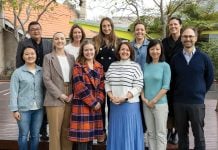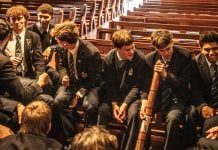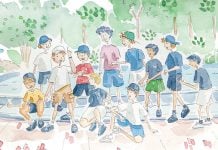One of the defining characteristics of our School culture is our understanding that the impetus for change does not always have to come from teachers and staff. Our students also know they have the capacity to transform the way we do things, and the permission to ask: how can we do better?
This year the three Senior School leaders – School Co-Vice Captains Hugo Bennett and Oliver Martin, along with Captain of School Jack Flintoft – came together to ask this question in relation to one of the School’s core strategic priorities: sustainability.
While the achievements they have made are just the beginning of a transformative project, the groundwork they are laying has enormous potential.
Bringing the right people together
Encouraged by Director of Teaching and Research Andrew Baylis, Hugo, Oliver and Jack began their project by defining three strands of sustainability: social, environmental, and economic.
“At the start, we did a lot of brainstorming with the help of the Sustainable Lifestyle Improvement Committee (SLIC),” explains Hugo. “We eventually came up with a mission and vision, which we pitched to the other 10 Senior School student committees, outlining what we hope the School can achieve over the next five years.”
“Starting with a small group meant we could make decisions easily and take action more quickly,” Hugo adds. “Mr Baylis was always there to encourage us, and to hold us accountable as well.”
Taking small steps toward big changes
The three School leaders explain that one of the key aspects of their approach was to resist the temptation to look outside the School before they had considered the sustainable actions already underway at Melbourne Grammar.
“When we met with student committee leaders, we made sure we talked about what they were currently doing that aligned with our sustainability goals,” explains Jack. “It turned out there were many areas where our ideas and their actions overlapped. Having these conversations, we could also see we’d planted the seed to get them thinking about what else they could achieve.”
“We realised we had to look inside our own community first, before we tried to solve all the problems of the world,” adds Oliver. “We saw that we only needed to take small steps to have a real impact and that, even though our community includes a lot of diverse ideas, we all have the same goal – it’s just a matter of how we get there.”
Having sparked a conversation across many student groups, Hugo, Jack and Oliver have also communicated their plans for sustainable action to next year’s school leaders, as well as to the Wadhurst community, so their efforts can continue.
“It’s our belief that everyone should be involved in student-led actions like this,” adds Andrew. “There are many opportunities here for us to come together around our Towards 2030 goals, and this kind of work shows just how much students can do when they are supported to take action themselves.”



